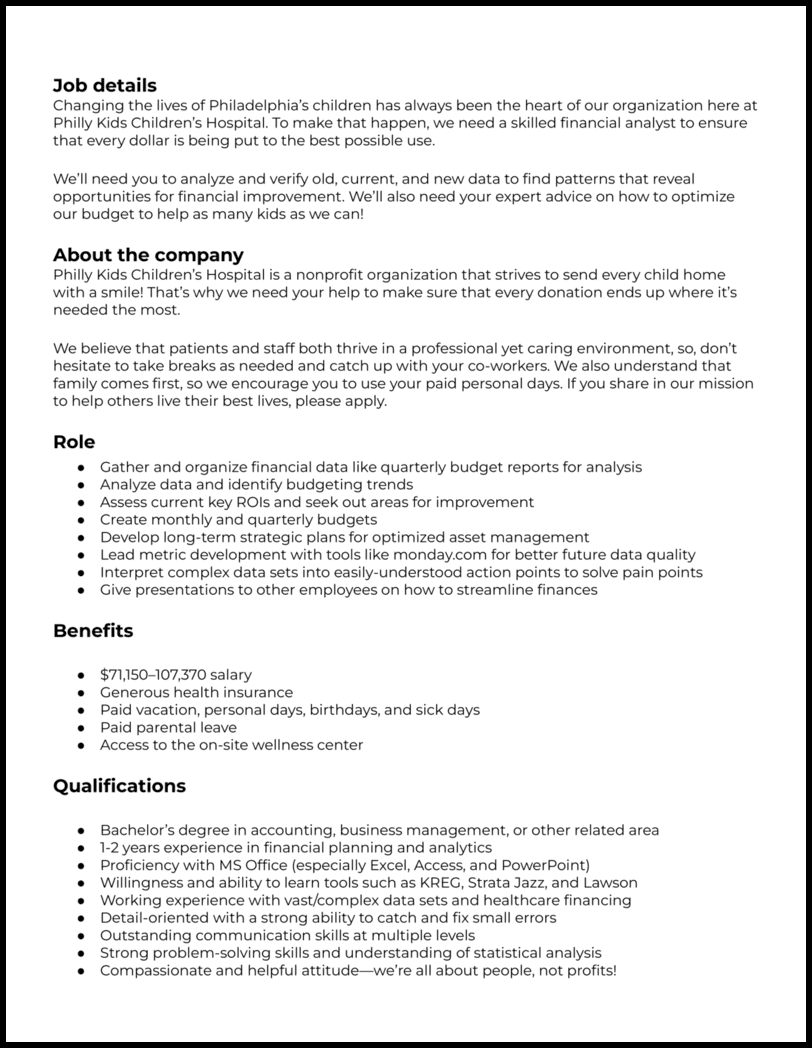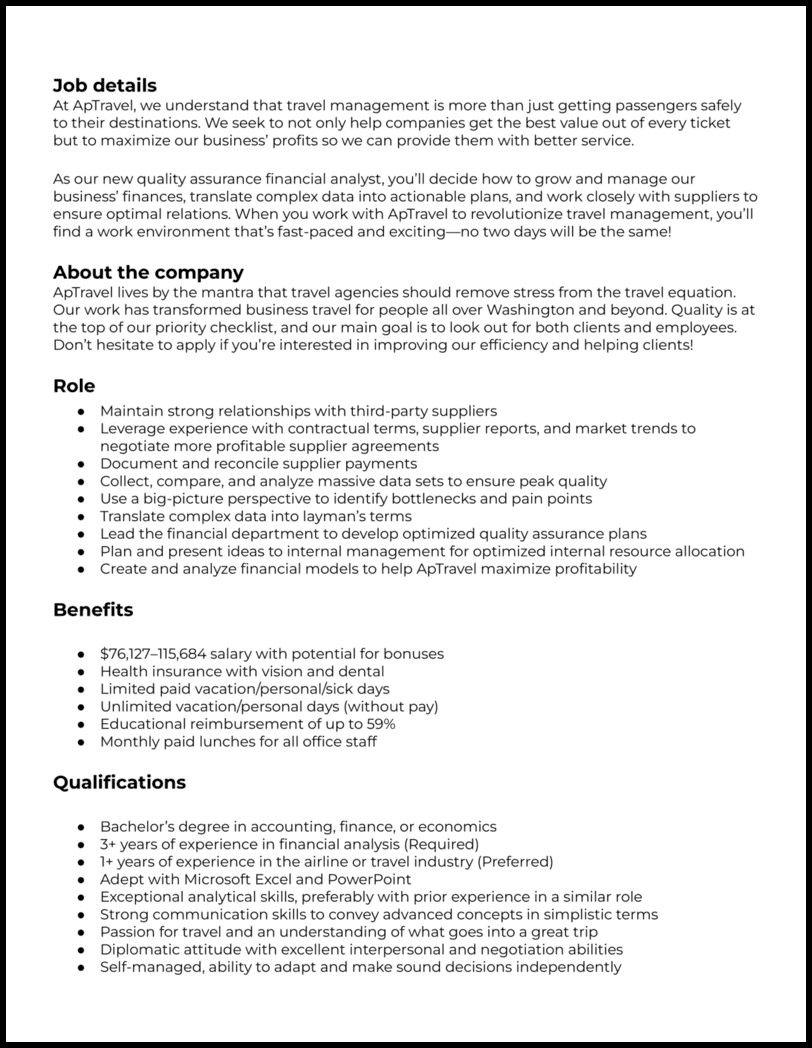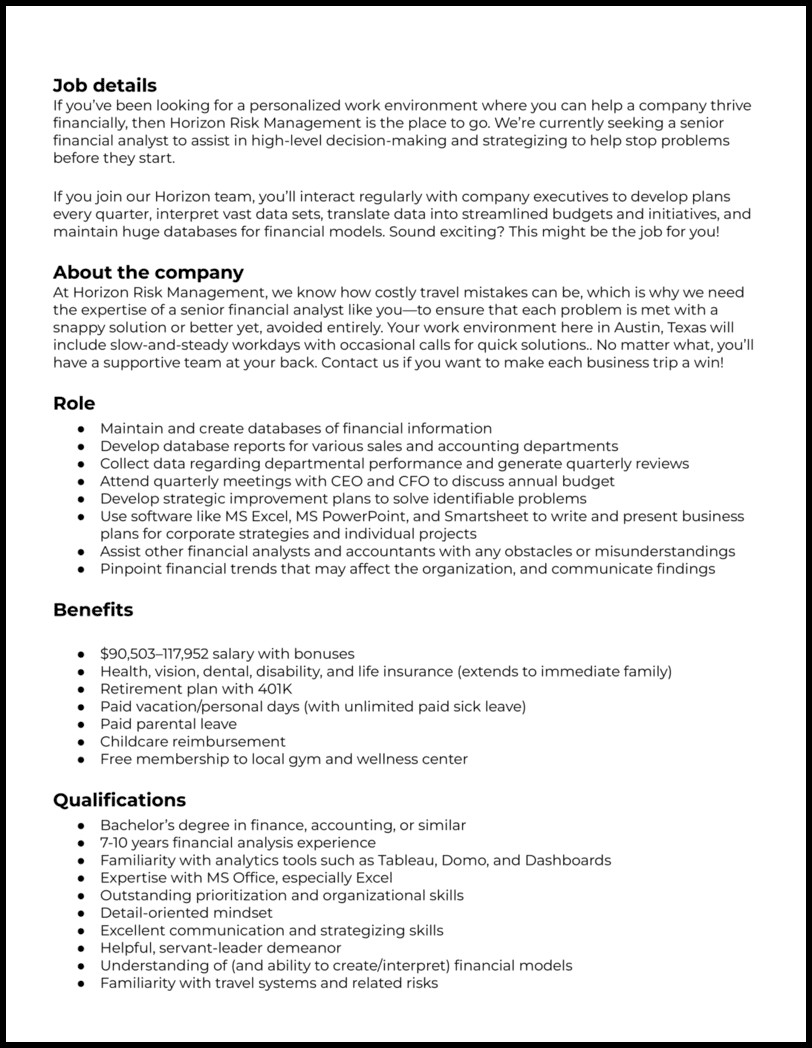So you’re thinking of hiring a financial analyst—a specialist who gathers and interprets financial data, translating it into actionable insights to bolster your business?
Just like you want your new hire to have an eye for detail and an ability to develop plans proactively, your financial analyst job description needs to mimic that same thoughtful approach.
Instead, take our hand and let us help you with some personality-rich building blocks for your own job description—and get ready for the avalanche of financial analyst resumes and cover letters you’re about to receive!
Why this job description works
- When your organization centers around a passionate value system, you can increase emphasis by leveraging your qualifications section. Avoid simply listing what matters to you—use wording that demonstrates your focal points.
- If helping children or marginalized demographics is near and dear to your heart, then describe how key requirements further your objectives. Why exactly is a compassionate attitude or excellent communication important enough to list?
- Any company worth its salt will offer basic benefits, so make sure you mention extra perks that make your workplace special, like snack provisions or flexible personal and family days.
- Stating unique benefits in your financial analyst job description might encourage applicants to branch out and include resume-worthy interests and hobbies in their resumes that’ll catch your eye.
Why this job description works
- All good applicants want to know what your work environment’s pacing is like. Will they mainly sit at their desk focusing on routine tasks, or will their role be more active and dynamic?
- If there’s a lot of variety within your open job role, give examples in your quality assurance financial analyst job description—mention whether the position entails working directly with suppliers, what type of data interpretation is involved, and so on.
- Demonstrate your central objectives and company culture so that the “mood” of the job is clear.
- Is your team chill, corporate, or somewhere in between? Either way, show your personality and see which quality assurance financial analyst resume matches best—from the candidate’s abilities down to the resume template style they pick!
Why this job description works
- When looking for a senior-level employee, show that you value the expertise they’ve worked for years to earn. List core job skills, but encourage the applicant to let their personality shine, too!
- Your senior financial analyst job description’s intro paragraph is the perfect opportunity to highlight individuality: use an inviting tone to attract candidates who will bring something exceptional to the table.
- While using your writing style to draw the personality type you want for your team, don’t forget to guide the reader’s attention to the important tasks that make your open role a high-level one.
- List details that hint at what the perfect senior financial analyst resume should include: what types of departments will your new hire collaborate with? Which high-level executives will they meet with and report to?
Devise a Financial Analyst Job Description

Sadly, most financial analyst job descriptions tank faster than a set of ill-managed assets—because they’re too generic. Candidates want to know what kinds of people they’ll work with, what projects they can expect to handle, and more. You don’t want your job ad to be one of those dime-a-dozen ads.
There are still plenty of opportunities to let your company culture shine through.
Clearly outline job expectations, format them nicely to avoid scaring off the very candidates you’re hoping to attract, and don’t hesitate to show a bit of personality! While the financial analyst field has strong technical and logical themes, there are still opportunities to let your company culture shine through while you list what applicants can expect.
Just double-check to make sure you’ve covered all the must-have details thoroughly yet concisely!

Take stock of who you need on your team and why
So, why do you want to hire a financial analyst, anyway? Are you scratching your head when you try to understand your profit margins? Do you have a gnawing feeling that some of your records may not be up to par? Maybe you’d simply like to boost your ROIs as much as possible!
No matter your motivations, keep them in mind while you write your job description; these core reasons for needing a financial analyst are the foundation for your entire process.
Mirror what you wish to see
- Consider these concrete ways that you can reflect ideal qualities in the way you write your job description. When your dream financial analyst reads it, they should think, “That’s so me!” right before they apply.
- Naturally, you’re looking for a hire who’ll notice key details and catch errors. But does your job description show that you paid just as much attention—or does it contain embarrassing mistakes?
- Organization is key in a financial analyst’s job—especially when it comes to high volumes of data! But is your job description equally clean and organized?
- Clear communication is essential for your new hire to distill massive data sets into clear, usable goals, so make sure your job description is clear and informative!

Analyze and revise for a thoughtfully-developed job description
You don’t want your job description to be a lengthy mess, so get your brain dumping out right at the beginning. Roll with your ideas and jot everything down—just remember to edit and consolidate before you hit “publish!”
Don’t underestimate the impact of revision. It doesn’t just catch nasty typos: it can also ensure you’re reflecting the qualities you want to see in your ideal hire, too. Revise and edit until your job description is as organized, thoughtful, and informative as you want your new financial analyst to be!
Outlining Your Financial Analyst Job Description

After reading those three financial analyst job descriptions and some extra information on how to hone your own approach, it’s about time to get started: this outline could be just what you need to begin writing your own job description and get those financial analyst resumes rolling in!

Job details
People want to know what they’re signing up for, so jumping into your financial analyst job ad with brief but impactful details about the workplace and the job is a smart move. Provide a brief overview of what your company is like, and give a general idea of what your new hire could expect on the job.
What kinds of datasets will your new financial analyst be working with? Will they be analyzing them alone or in a team setting? What audiences will they be translating their discoveries for, and how involved will their presentations need to be? What obstacles in your company are you looking to solve?

About us
People want to know about other people—who they’ll be working with and who they’ll be working for. Including some fun facts or relevant details about your organization’s mission statement, company culture, and work environment will demonstrate openness and help you attract the right fit for the job.
There’s plenty of room in your responsibilities and qualifications lists for technical details about the job role—now’s the time to show your readers what it would feel like to work for your company!

Roles
You can also call this section “responsibilities,” “what you’ll be doing,” or any number of things. Whatever you call this, this is where you’ll outline what routine tasks, like monthly reports and everyday data analysis, will look like for your new hire.
You can also include the possible outliers you’ll want them to be prepared for, such as the potential need to pitch new ideas to third-party suppliers. Be sure to include tasks you’d want to know about before applying for the job because candidates will want to know, too!
- Maintain and create databases of financial information
- Develop database reports for various sales and accounting departments
- Collect data regarding departmental performance and generate quarterly reviews with constructive feedback on how to optimize progress
- Attend quarterly internal meetings with CEO and CFO to discuss annual budget progress and projections

Qualifications
This section serves both as a filter and as an opportunity for you to let potential applicants know how strict or flexible your workplace is. List any degrees, certifications, or programs that are absolute must-haves to lay the foundation for your job expectations.
Then, get creative and write out any other highly desirable qualities you’re looking for in your new financial analyst. These could be technical skills, like proficiency with MS Suite, or they could be soft skills that highlight your company culture, like a diplomatic attitude.
- Ability to use or learn tools such as KREG, Strata Jazz, and Lawson
- Confidence and familiarity with vast and complex data sets
- Detail-oriented with a strong ability to catch and fix small errors
- Working familiarity with healthcare financing

Salary and benefits
While the phrase, “Show me the money!” may come to mind, there’s more to employee benefits than that nice salary and the potential for commissions or bonuses. With so many parents balancing work and family, is your company able to offer paid parental leave or financial assistance for childcare during work hours? How about classics like health insurance and retirement plans?
Be transparent about what benefits you do and don’t offer. For example, make it clear whether sick days or personal time off will be paid or unpaid and whether or not health insurance benefits extend to family members.
Roles and Functions Inside the Financial Analyst Racket

Financial analysts come in many different forms and take on a wide variety of roles: one person may not perform all of the following roles, but these should give you a good starting point! The niche hire you’re looking for will depend on which hurdles your organization’s currently facing, so check out these examples of potential issues and the specialists who can help you solve them.

Risk Analyst
You aren’t sure how it happened, but something punched your business right in the wallet—and you never want to take a hit like that again! A risk analyst can step in here to help guard against potential pitfalls.
- Maintain familiarity with company travel systems and common related risks, developing plans to mitigate future dangers
- Critical thinking skills, organization, and collaboration are all essential in this job role.

Investment banking analyst
Every company has dreams of growing its profits, and skillfully-timed investments can be the key to success. But where do you even begin when it comes to navigating the world of investment banking? Don’t worry—there’s a specialist for that!
- Create and interpret financial models alongside researching investment trends for analysis
- An analytical mindset is clearly crucial here, as is the ability to seek out beneficial market patterns—or warning signs! Communication within a team setting is also highly important for an investment banking analyst.

Financial Planning and Analyst (FP&A) analyst
Sometimes, an organization’s profits might take a hit—and it’s not entirely clear which department is struggling to stay afloat. Which department within the company has been struggling to meet sales objectives or deadlines, resulting in added costs? A good FP&A analyst could help you out here.
- Collect data regarding departmental performance and generate quarterly reviews with constructive feedback on how to optimize progress
- These types of financial analysts need a strong working knowledge of budgeting and profit margins alongside the ability to consolidate multiple large sets of data for each department.

Financial quantitative analyst
Sometimes you need help from a professional who can assist with investments while also providing more well-rounded mathematical and data-based solutions across departments.
For example, if you’re working with vast assortments of data that are so large you can’t even imagine planning how to invest or manage your assets, then you might benefit from the number-savvy expertise of a Financial Quantitative Analyst!
- Develop strategic, math-based improvement plans to solve identifiable problems with quantifiable motivations for each objective
- Data analysis, an understanding of mathematics and algorithms, and critical thinking abilities across multiple areas are critical for this role.

Ratings analyst
It’s inevitable: sometimes, companies hit rough patches and begin to struggle with debt. This issue can spiral out of control in the blink of an eye when you’re working with large budgets, so you might want to ask a ratings analyst for help.
- Assess credit risk and help pinpoint weak points in the organization’s financial strategy to prevent further losses and recover
- Communication skills, data analysis, critical thinking, and excellent planning skills are all essential for the damage control involved in this job role.

Treasury analyst
Are you a higher-up or even government-level agency needing someone to preserve your long-established financial health and make helpful projections about the future? Not every financial analyst will have the right knowledge for the job, but a treasury analyst may fit the bill!
- Make recommendations regarding current and future financial management strategies based on past data, coordinating with other finance departments as needed
- This job role generally requires a high level of experience within the financial analysis field, alongside a knack for wise strategizing and skillful investment planning.

Corporate development analyst
Do you sense the momentum building as your company grows and feel eager to make the most of it but lack the precise expertise to make it happen? It can be frustrating not to know how to use your resources to ensure your business’ optimal growth, so you might want to enlist the help of a corporate development analyst.
- Interpret complex data sets into easily-understood action points to solve corporate pain points
- People skills are a must here since expanding the company’s customer segments is a core part of corporate growth. A corporate development analyst must also be able to think critically, adapt skilled budgeting plans to an individual company’s needs, and work well with data.








